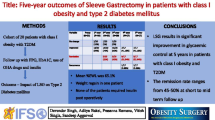Abstract
Background
There are a dearth of studies comparing laparoscopic sleeve gastrectomy (LSG) and intensive medical treatment (IMT) in obese type 2 diabetes mellitus (T2DM) patients. This study compares these modalities in terms of weight loss, metabolic parameters and quality of life (QOL) score.
Methods
We evaluated the efficacy of LSG (n = 14) vs. IMT (n = 17) comprising of low calorie diet, exenatide, metformin and if required insulin detemir in 31 obese T2DM patients with BMI of 37.9 ± 5.3kg/m2 and target HbA1c < 7 %. The mean (±SD) age of the patients was 49.6 ± 11.9 years and 74 % were women. The mean duration of diabetes was 8.5 ± 6.1 years and mean HbA1c was 8.6 ± 1.3 %. Primary end point was excess body weight loss (EBWL) at the final follow-up.
Results
The mean duration of follow-up was 12.5 ± 5.0 (median 12) months. EBWL was 61.2 ± 17.6 % and 27.4 ± 23.6 % in LSG and IMT group respectively (p < 0.001). Glycemic outcomes improved in both with mean HbA1c of 6.6 ± 1.5 % in LSG and 7.1 ± 1.2 % in IMT group. In LSG group, there was resolution of diabetes and hypertension in 36 and 29 % of patients respectively while none in the IMT group. HOMA-IR, hsCRP, ghrelin and leptin decreased while adiponectin increased significantly in LSG compared to IMT group. QOL score improved in LSG as compared to IMT.
Conclusions
In obese T2DM patients, LSG is superior to IMT in terms of weight loss, resolution of comorbidities and QOL score.


Similar content being viewed by others
References
Anjana RM, Pradeepa R, Deepa M, et al. Prevalence of diabetes and prediabetes (impaired fasting glucose and/or impaired glucose tolerance) in urban and rural India: phase I results of the Indian Council of Medical Research-INdia DIABetes (ICMR-INDIAB) study. Diabetologia. 2011;54(12):3022–7.
Yang W, Lu J, Weng J, et al. Prevalence of diabetes among men and women in China. N Engl J Med. 2010;362(12):1090–101.
Standards of medical care in diabetes. Diabetes Care. 2013; 36 Suppl 1:S11-66.
Dixon JB, Zimmet P, Alberti KG, et al. Bariatric surgery: an IDF statement for obese type 2 diabetes. Diabet Med J Br Diabet Assoc. 2011;28(6):628–42.
Garcia-Caballero M, Valle M, Martinez-Moreno JM, et al. Resolution of diabetes mellitus and metabolic syndrome in normal weight 24–29 BMI patients with one anastomosis gastric bypass. Nutr Hosp Org Of Soc Esp Nutr Parenter Enter. 2012;27(2):623–31.
Garber AJ, Abrahamson MJ, Barzilay JI, et al. AACE comprehensive diabetes management algorithm 2013. Endocr Pract Off J Am Coll Endocrinol Am Assoc Clin Endocrinologist. 2013;19(2):327–36.
Zachariah S, Sheldon B, Shojaee-Moradie F, et al. Insulin detemir reduces weight gain as a result of reduced food intake in patients with type 1 diabetes. Diabetes Care. 2011;34(7):1487–91.
Verges B, Bonnard C, Renard E. Beyond glucose lowering: glucagon-like peptide-1 receptor agonists, body weight and the cardiovascular system. Diabetes Metab. 2011;37(6):477–88.
Scopinaro N, Gianetta E, Adami GF, et al. Biliopancreatic diversion for obesity at eighteen years. Surgery. 1996;119(3):261–8.
Cummings DE, Overduin J, Foster-Schubert KE, et al. Role of the bypassed proximal intestine in the anti-diabetic effects of bariatric surgery. Surg Obes Relat Dis Off J Am Soc Bariatric Surg. 2007;3(2):109–15.
Moo TA, Rubino F. Gastrointestinal surgery as treatment for type 2 diabetes. Curr Opin Endocrinol Diabetes Obes. 2008;15(2):153–8.
Mechanick JI, Youdim A, Jones DB, et al. Clinical practice guidelines for the perioperative nutritional, metabolic, and nonsurgical support of the bariatric surgery patient—2013 update: cosponsored by American Association of Clinical Endocrinologists, The Obesity Society, and American Society for Metabolic & Bariatric Surgery. Obesity (Silver Spring). 2013;21 Suppl 1:S1–27.
Dixon JB, Straznicky NE, Lambert EA, et al. Surgical approaches to the treatment of obesity. Nat Rev Gastroenterol Hepatol. 2011;8(8):429–37.
Fischer L, Hildebrandt C, Bruckner T, et al. Excessive weight loss after sleeve gastrectomy: a systematic review. Obes Surg. 2012;22(5):721–31.
Buchwald H, Avidor Y, Braunwald E, et al. Bariatric surgery: a systematic review and meta-analysis. JAMA J Am Med Assoc. 2004;292(14):1724–37.
Vilsboll T, Christensen M, Junker AE, et al. Effects of glucagon-like peptide-1 receptor agonists on weight loss: systematic review and meta-analyses of randomised controlled trials. BMJ. 2012;344:d7771.
Astrup A, Rossner S, Van Gaal L, et al. Effects of liraglutide in the treatment of obesity: a randomised, double-blind, placebo-controlled study. Lancet. 2009;374(9701):1606–16.
Dushay J, Gao C, Gopalakrishnan GS, et al. Short-term exenatide treatment leads to significant weight loss in a subset of obese women without diabetes. Diabetes Care. 2012;35(1):4–11.
Schauer PR, Kashyap SR, Wolski K, et al. Bariatric surgery versus intensive medical therapy in obese patients with diabetes. N Engl J Med. 2012;366(17):1567–76.
Mingrone G, Panunzi S, De Gaetano A, et al. Bariatric surgery versus conventional medical therapy for type 2 diabetes. N Engl J Med. 2012;366(17):1577–85.
Yong W, Shibo W, Jingang L. Remission of insulin resistance in type 2 diabetic patients after gastric bypass surgery or exenatide therapy. Obes Surg. 2012;22(7):1060–7.
Batsis JA, Lopez-Jimenez F, Collazo-Clavell ML, et al. Quality of life after bariatric surgery: a population-based cohort study. Am J Med. 2009;122(11):1055 e1–1055 e10.
Dymek MP, Le Grange D, Neven K, et al. Quality of life after gastric bypass surgery: a cross-sectional study. Obes Res. 2002;10(11):1135–42.
Jackness C, Karmally W, Febres G, et al. Very low calorie diet mimics the early beneficial effect of roux-en-y gastric bypass on insulin sensitivity and beta-cell function in type 2 diabetic patients. Diabetes. 2013.
Acknowledgments
We are grateful to Sun Pharmaceutics, India for providing exenatide (Exapride) for the study.
Conflict of Interest
None.
Author information
Authors and Affiliations
Corresponding author
Rights and permissions
About this article
Cite this article
Palikhe, G., Gupta, R., Behera, B.N. et al. Efficacy of Laparoscopic Sleeve Gastrectomy and Intensive Medical Management in Obese Patients with Type 2 Diabetes Mellitus. OBES SURG 24, 529–535 (2014). https://doi.org/10.1007/s11695-013-1114-9
Published:
Issue Date:
DOI: https://doi.org/10.1007/s11695-013-1114-9



